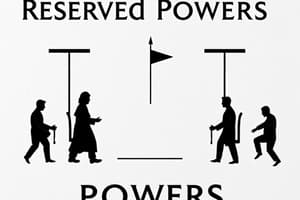Podcast
Questions and Answers
What type of jurisdiction allows a court to have sole authority to hear a case?
What type of jurisdiction allows a court to have sole authority to hear a case?
- Limited jurisdiction
- Concurrent jurisdiction
- Appellate jurisdiction
- Original jurisdiction (correct)
Which of the following is NOT a specific case the Judicial Branch hears?
Which of the following is NOT a specific case the Judicial Branch hears?
- Civil rights cases
- Federal tax disputes
- Disputes between states
- Traffic violations (correct)
What establishes the authority of Congress to create Inferior Courts?
What establishes the authority of Congress to create Inferior Courts?
- Judicial precedents
- State laws
- The Constitution (correct)
- Federal regulations
What is the primary role of Constitutional Courts?
What is the primary role of Constitutional Courts?
Who nominates judges for federal courts?
Who nominates judges for federal courts?
What distinguishes Judicial Restraint from Judicial Activism?
What distinguishes Judicial Restraint from Judicial Activism?
For how long are judges of Constitutional Courts appointed?
For how long are judges of Constitutional Courts appointed?
How can judges in Constitutional Courts be removed from their position?
How can judges in Constitutional Courts be removed from their position?
What is the primary purpose of the U.S. Court of Federal Claims?
What is the primary purpose of the U.S. Court of Federal Claims?
What statement regarding military commissions is accurate?
What statement regarding military commissions is accurate?
Which body confirms judges nominated by the President?
Which body confirms judges nominated by the President?
What is meant by Judicial Activism?
What is meant by Judicial Activism?
What term do U.S. Marshals serve?
What term do U.S. Marshals serve?
Which of the following is NOT a responsibility of U.S. Marshals?
Which of the following is NOT a responsibility of U.S. Marshals?
What is one of the responsibilities of U.S. Attorneys?
What is one of the responsibilities of U.S. Attorneys?
What distinguishes the U.S. Court of Appeals for Veterans Claims from other courts?
What distinguishes the U.S. Court of Appeals for Veterans Claims from other courts?
Which courts are considered Legislative or Special Courts established by Congress?
Which courts are considered Legislative or Special Courts established by Congress?
What is the primary role of Constitutional Courts?
What is the primary role of Constitutional Courts?
How can judges in Constitutional Courts be removed from their position?
How can judges in Constitutional Courts be removed from their position?
Which statement regarding military commissions is accurate?
Which statement regarding military commissions is accurate?
What does Congress set for federal judges?
What does Congress set for federal judges?
Flashcards
Exclusive Jurisdiction
Exclusive Jurisdiction
The sole authority of a court to hear a case.
Role of Constitutional Courts
Role of Constitutional Courts
They handle cases arising under federal laws, treaties, and the Constitution.
Removal of Constitutional Court Judges
Removal of Constitutional Court Judges
Impeachment by Congress for ''treason, bribery, or other high crimes and misdemeanors''.
U.S. Court of Federal Claims Responsibility
U.S. Court of Federal Claims Responsibility
Signup and view all the flashcards
Courts of Appeals Distinction
Courts of Appeals Distinction
Signup and view all the flashcards
Military Commissions Role
Military Commissions Role
Signup and view all the flashcards
Judicial Restraint vs. Activism
Judicial Restraint vs. Activism
Signup and view all the flashcards
Exclusive Jurisdiction
Exclusive Jurisdiction
Signup and view all the flashcards
Constitutional Courts Role
Constitutional Courts Role
Signup and view all the flashcards
Removing Judges
Removing Judges
Signup and view all the flashcards
U.S. Court of Federal Claims
U.S. Court of Federal Claims
Signup and view all the flashcards
Courts of Appeals Review
Courts of Appeals Review
Signup and view all the flashcards
Legislative/Special Courts
Legislative/Special Courts
Signup and view all the flashcards
Judicial Restraint vs. Activism
Judicial Restraint vs. Activism
Signup and view all the flashcards
Exclusive Jurisdiction
Exclusive Jurisdiction
Signup and view all the flashcards
Legislative/Special Courts
Legislative/Special Courts
Signup and view all the flashcards
Constitutional Courts' Role
Constitutional Courts' Role
Signup and view all the flashcards
Removing Federal Judges
Removing Federal Judges
Signup and view all the flashcards
Federal Court Judge Term Length
Federal Court Judge Term Length
Signup and view all the flashcards
U.S. Court of Federal Claims
U.S. Court of Federal Claims
Signup and view all the flashcards
Judicial Restraint vs. Activism
Judicial Restraint vs. Activism
Signup and view all the flashcards
Study Notes
Exclusive Jurisdiction
- Exclusive jurisdiction allows a court to have sole authority to hear a case.
Non-Judicial Branch Cases
- The Judicial Branch does not hear every type of case. Specific examples of cases not heard by this branch are not listed.
Congressional Authority for Inferior Courts
- Article III of the Constitution establishes the authority of Congress to create lower federal courts.
Constitutional Courts' Primary Role
- Constitutional courts handle cases involving federal law and U.S. Constitution issues.
Removal of Constitutional Court Judges
- Judges in Constitutional Courts can be removed through impeachment.
U.S. Court of Federal Claims' Purpose
- The U.S. Court of Federal Claims handles claims against the federal government.
Courts of Appeals - Fact
- The statements regarding courts of appeals are not detailed.
U.S. Court of Appeals for Veterans Claims Distinguishing Feature
- The U.S. Court of Appeals for Veterans Claims is different because it is specialized in veterans' claims matters.
Legislative/Special Courts
- Legislative or special courts are those created and established by Congress to address or handle specific types of subjects. The specific courts are not named.
Military Commissions - Truth
- The statement about military commissions is not detailed.
Judicial Appointments
- The President nominates judges for federal courts.
Constitutional Court Judge Appointments
- Constitutional Court judges serve lifetime appointments.
U.S. Attorneys' Responsibilities
- U.S. Attorneys prosecute cases for the federal government.
Judicial Restraint vs. Judicial Activism
- Judicial restraint maintains precedent. Judicial activism promotes new interpretations of the Constitution.
Senate Role in Judicial Appointments
- The Senate confirms judicial nominees.
U.S. Marshals' Term
- U.S. Marshals' terms are not specified.
U.S. Marshals' Non-Responsibilities
- The specific non-responsibilities of the U.S. Marshals are not identified.
Judicial Activism Definition
- Judicial activism is a philosophy where judges actively interpret the Constitution to impact contemporary social and political issues.
Federal Judge Compensation
- Congress sets salaries for federal judges.
Court Judge's Explanation During Trial
- Judges provide instructions to juries about procedures and applicable law during a trial.
Studying That Suits You
Use AI to generate personalized quizzes and flashcards to suit your learning preferences.




